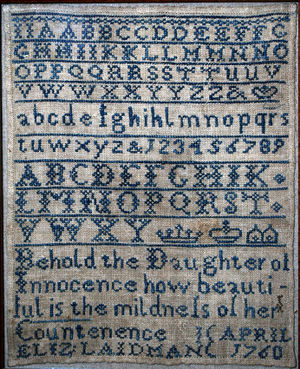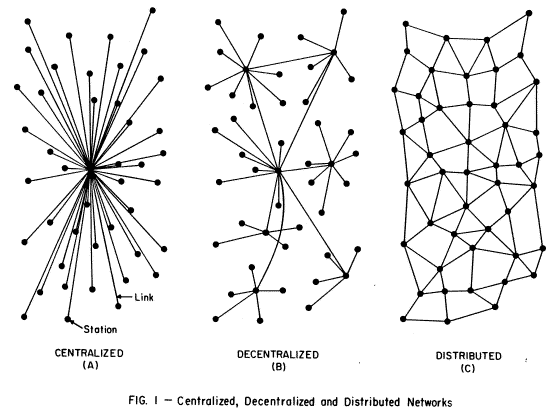Networked Media Sampler: Difference between revisions
Renee Turner (talk | contribs) m (→Documentation) |
No edit summary |
||
| (37 intermediate revisions by 5 users not shown) | |||
| Line 5: | Line 5: | ||
Historically the “embroidery sampler” was a piece of fabric used to practice one’s skills and record favorite patterns to be shared with others. Rather than a cohesive design, its surface was embellished with “samples” or small embroidered demonstrations of embellished letters from the alphabet and decorative stitchery, which were intended to show the proficiency of the maker and uniqueness of the handcrafted designs. | Historically the “embroidery sampler” was a piece of fabric used to practice one’s skills and record favorite patterns to be shared with others. Rather than a cohesive design, its surface was embellished with “samples” or small embroidered demonstrations of embellished letters from the alphabet and decorative stitchery, which were intended to show the proficiency of the maker and uniqueness of the handcrafted designs. | ||
As a thematic project, the Networked Media Sampler takes this model as its starting point. Rather than a singular theme, it is a collection composed of a series of workshops, talks and presentations. Each element in the series is intended to highlight key areas of interest within networked culture and open source media practices. Through hands-on explorations and theoretical enquiry, the Networked Media Sampler will look at the contrast between closed and open | As a thematic project, the Networked Media Sampler takes this model as its starting point. Rather than a singular theme, it is a collection composed of a series of workshops, talks and presentations. Each element in the series is intended to highlight key areas of interest within networked culture and open source media practices. Through hands-on explorations and theoretical enquiry, the Networked Media Sampler will look at the contrast between closed and open systems. It will examine the limitations of the contemporary idea of the "Web", social media, and the so-called "Open Web". Next to this the project will look at models of network topologies and protocols, play with DIY approaches to building your own tools, and explore the dynamics of peer-to-peer exchange. | ||
Keeping with the tradition of the sampler, this thematic project is a means of testing the surface of a very rich and complex tapestry whose texture is constituted through intertwining threads, nodes and rhizomatic turns. | Keeping with the tradition of the sampler, this thematic project is a means of testing the surface of a very rich and complex tapestry whose texture is constituted through intertwining threads, nodes and rhizomatic turns. | ||
[[File:network_model.gif]] | |||
== Schedule== | |||
(dates subject to change – check wiki calendar for the most current information) | |||
* '''October 6''', [[Install Party]]: Reboot and Rethink, workshop | |||
* '''October 10th-11th''', [[Terminal Sessions]]: Getting down to basics, workshop | |||
== | * <strike>'''October 18th''' – Walter Langelaar Guest Lecture - moved - date to be announced</strike> | ||
* '''October 25th''' [[Programm(ed/ing) Culture]] Audrey Samson Guest Lecture & Eric Schrijver, Guest Lecuture and mini-workshop | |||
''' | * '''Nov. 1st''' [[Revisionism harms History]] AKA the Italian restaurant | ||
* '''Nov. 8th''' [[Border Gateway Protocol in Wonderland]] with Linda Hilfling | |||
''' | * '''Nov. 14-15''' [[Based on a True Story]] with Nicolas Malevé | ||
* '''Nov. 21,22,24''' [[Step by Step]] with Wendy Van Wynsberghe | |||
* '''Nov. 28-29''' [[Furtherfield]] with Ruth Catlow and Marc Garrett, Guest Lecture followed by tutorials | |||
* '''Nov. 29th''' [[A failed coup attempt with folk songs (Part V)]] with Seda Guerses | |||
* '''Dec. 5th – 6th''' [[Spoken Drawings]] workshop with OSP members | |||
* '''Dec. 15th''' Final presentations and assessments | |||
''' | |||
''' | |||
''' | |||
''' | |||
'''Wendy Van Wynsberghe''' | |||
''' | |||
Nov. | |||
Dec. 5th – 6th | |||
Dec. 15th Final presentations and assessments | |||
== Documentation == | == Documentation == | ||
Maintain your plans, notes on lectures, and work documentation on the wiki. Planning and documentation allows you to track your progress, prioritize course work, and helps staff to coordinate support and feedback. | Maintain your plans, notes on lectures, and work documentation on the wiki. Planning and documentation allows you to track your progress, prioritize course work, and helps staff to coordinate support and feedback. Remember, never be wiki-shy! | ||
[[File:poor.gif]] | |||
[[Category:Thematic project]] | |||
Latest revision as of 17:35, 15 September 2014
DIY NETWORK TOPOLOGIES & PROTOCOLS
Thematic Project Description
Historically the “embroidery sampler” was a piece of fabric used to practice one’s skills and record favorite patterns to be shared with others. Rather than a cohesive design, its surface was embellished with “samples” or small embroidered demonstrations of embellished letters from the alphabet and decorative stitchery, which were intended to show the proficiency of the maker and uniqueness of the handcrafted designs.
As a thematic project, the Networked Media Sampler takes this model as its starting point. Rather than a singular theme, it is a collection composed of a series of workshops, talks and presentations. Each element in the series is intended to highlight key areas of interest within networked culture and open source media practices. Through hands-on explorations and theoretical enquiry, the Networked Media Sampler will look at the contrast between closed and open systems. It will examine the limitations of the contemporary idea of the "Web", social media, and the so-called "Open Web". Next to this the project will look at models of network topologies and protocols, play with DIY approaches to building your own tools, and explore the dynamics of peer-to-peer exchange.
Keeping with the tradition of the sampler, this thematic project is a means of testing the surface of a very rich and complex tapestry whose texture is constituted through intertwining threads, nodes and rhizomatic turns.
Schedule
(dates subject to change – check wiki calendar for the most current information)
- October 6, Install Party: Reboot and Rethink, workshop
- October 10th-11th, Terminal Sessions: Getting down to basics, workshop
October 18th – Walter Langelaar Guest Lecture - moved - date to be announced- October 25th Programm(ed/ing) Culture Audrey Samson Guest Lecture & Eric Schrijver, Guest Lecuture and mini-workshop
- Nov. 1st Revisionism harms History AKA the Italian restaurant
- Nov. 8th Border Gateway Protocol in Wonderland with Linda Hilfling
- Nov. 14-15 Based on a True Story with Nicolas Malevé
- Nov. 21,22,24 Step by Step with Wendy Van Wynsberghe
- Nov. 28-29 Furtherfield with Ruth Catlow and Marc Garrett, Guest Lecture followed by tutorials
- Nov. 29th A failed coup attempt with folk songs (Part V) with Seda Guerses
- Dec. 5th – 6th Spoken Drawings workshop with OSP members
- Dec. 15th Final presentations and assessments
Documentation
Maintain your plans, notes on lectures, and work documentation on the wiki. Planning and documentation allows you to track your progress, prioritize course work, and helps staff to coordinate support and feedback. Remember, never be wiki-shy!
![]()


